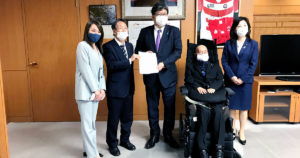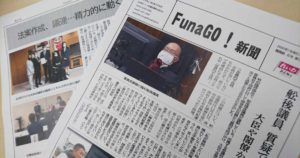外国特派員協会で記者会見を行いました
12月3日の「国際障害者デー」に合わせ、外国特派員協会で、木村英子議員とともに、記者会見に参加しました。
日本における障害者の現状や課題について、国会議員としてスピーチを行い、質問に答えました。
記者会見冒頭に行ったスピーチの内容は以下の通りです。
皆様 こんにちは。れいわ新選組、参議院議員の舩後靖彦でございます。
日本に於ける障害者の人権や現状についてお話する機会をいただきありがとうございます。
私は、宝石や時計を扱う商社マンとして働いていた2000年に、筋萎縮性側索硬化症 エーエルエスと診断されました。当初は「全身マヒになって人の世話になって生きるくらいなら、死んでしまいたい」と考えていました。しかし、エーエルエスと宣告されたばかりの患者さんに自分の経験を話すピアサポートの活動をして、自分にはまだやることがある、と思い直し、2002年に人工呼吸器を付け、生き延びる選択をしました。
その後、障害者施設に入所していたとき、また、施設を出て自立生活を始めた当初、ネグレクトや不適切なケアを経験し、同じ人間なのに健常者と障害者と分断され、障害者が不幸な世の中はおかしい、と考えるようになりました。そこで、地元の松戸市議選に出馬しました。そのときは落選しましたが、昨年の参議院選挙で、れいわ新選組から「比例特定枠」候補として立候補して初当選しました。現在、インクルーシブ教育・保育の実現や、障害者が地域で暮らし、働くための法制度整備、環境整備に取り組んでいます。
日本の障害者の人権、現状に関して、最初に指摘したいのは、日本は諸外国と比べ入所施設、精神科病院に入っている人の数が多く、その入所年数が極めて長いことです。施設から地域に出て定員が空いても、すぐに新規の入所者で埋められます。結果的にこの15年間で、身体障害者施設は18.9万人から7.3万人まで減っていますが、知的障害者は13万人から13.2万人で微増、精神障害者は34.5万人から30万人と微減です。
こうした中で、2016年、相模原市の知的障害者施設「津久井やまゆり園」で元職員が障害者19人を殺害する事件が起きました。この事件は、施設の閉じられた環境・固定化された関係性の問題と、施設を必要とする地域社会の問題を象徴する事件だと私は捉えています。
2点目に、障害者関連の法制度は比較的整っていますが、都市部と地方との格差が大きく、また運用面の問題があります。
私のような進行性難病で人工呼吸器を使い、自立生活をしている方は、欧米と比較して日本は多いと思います。それは、国民皆保険の医療保険のもとで人工呼吸器のレンタルが可能となり、地域で暮らす上で必要な地域医療、訪問看護、長時間介護が可能な重度訪問介護制度があるからです。これらの制度は、当事者、家族の長い運動の成果であります。
しかし、市区町村が必要なサービス時間を認めてくれない、訪問看護・重度訪問介護サービスを提供できる事業所・人材が不足し、家族に負担がかかり、比較的サービスが厚い東京などの都市部に引っ越さざるを得ない、という状況があります。
3点目に、障害者に対する意識のバリアが未だに厚いと感じています。例えば、知的障害があるお子さんや医療的ケアの必要なお子さんが地域の学校に通いたいと希望すると、ネット上で「障害のない子どもに迷惑がかかる」「わがままだ」という批判が上がります。また職場では、障害のある人と一緒に働く際に、どのように接していいのかわからない、ということもあります。
私個人の経験では、国会議員になったあと、ある国会議員から「聞こえているの?」と言われたことがあります。また、インターネット上で、「言葉を話せない障害者に議員がつとまるわけがない」と中傷されたことがあります。
この意識の壁は、日本が1979年に養護学校を義務化し、障害のある子とない子を分ける教育を続けてきたため、日常的に障害のある人と触れ合うことなく過ごしてきてしまったことが大きいと考えています。1点目に挙げた施設入所が減らない理由も、小さい時から地域の同世代と一緒に学び・育っていないために、親も障害のある子も地域社会で頼れる人間関係がないことが大きいと思います。
私は、日本の障害者の状況を変える一番の方法は、小さいときから一緒に学び育つ、インクルーシブ保育・教育と考え、制度転換を実現したいと考えております。ご清聴ありがとうございました。
Speech at the Foreign Correspondents' Club of Japan
Hello, everyone. I am Funago Yasuhiko, a member of the House of Councilors, from the Reiwa Shinsengumi. I thank you for the opportunity to speak about rights and other current circumstance of people with disabilities in Japan.
I was diagnosed with Amyotrophic Lateral Sclerosis (ALS) in 2000. It was when I was working as a businessman for a jewelry and watch trading company. At first I felt "I would rather die than live in a state of total paralysis and being cared for by others". However, through peer support activities, by sharing my experiences with other patients who were just after being diagnosed with ALS, I reminded myself that I still had work to do. So, I made the choice to survive and wear a ventilator in 2002.
After that time, I had faced neglects and inadequate cares in an institution for people with disabilities; and when I was starting to live independently after I left the institution. These experiences made me a question. Is there something wrong with this society where we, as human beings, are divided into two groups: able-bodied and disabled people; and people with disabilities are left feeling unhappy?
Therefore, I ran for the local Matsudo City Council, but was not elected. However, in last year's proportional representation election for the House of Councilors, I became one of the Reiwa Shinsengumi’s candidates and was elected for the first time.
Now I am working on the development of legal systems and policy schemes for the realization of inclusive education, childcare, and community environment where people with disabilities to live and work.
Regarding the human rights issues of people with disabilities in Japan, firstly, I would like to point out that many people with disabilities are in either residential institutions or psychiatric hospitals in Japan. The number of residents in such institutions or hospitals is higher than other countries and the duration of hospitalization is very long. Furthermore, even there are people who leave these facilities and move to the community, the vacancies are quickly filled with new residents. Over the past 15 years, although the number of residents in institutions for the physically disabled has decreased from 189,000 to 73,000, others are not that changed: indeed the number of residents in institutions for people with intellectual disabilities has increased slightly from 133,000 to 132,000; and the number of inpatients in psychiatric hospitals has decreased slightly from 345,000 to 300,000.
It happened in such a context that in 2016 a former employee of Tsukui Yamayurien, the residential institution for people with intellectual disabilities in Sagamihara City, murdered 19 residents with disabilities.
It seems to me that this case is emblematic of the problems of current society. On one hand, there are the confined environment and entrenched relationships in institutions; and on the other hand, there are problems of the community that needs such institutions.
Secondly, although the legal system related to people with disabilities appears relatively well-developed in Japan, there are problems of disparity between urban and rural municipalities in the operation of the disability support system.
Compared to Western countries, in Japan, it appears more patients like me who are living independently with advanced intractable diseases and using ventilators. The national health insurance system allows us to rent ventilators, and provides community medical care and home nursing care. The visiting care for persons with severe disabilities is undertaking the disability welfare service provides a long time home care. These systems, which are the result of long campaigns by people with disabilities and their families, has enabled patients with advanced intractable diseases live in the community with supports.
However, there are problems in rural areas: not only rural municipalities do not allocate enough hours of support provision which service users need, but also there are a shortage of providers and workforce for both home nursing and visiting care for persons with severe disabilities. These aspects place burdens on families of service users and as a result some service users are forced to move to urban areas such as Tokyo, where services are relatively better.
Thirdly, I feel there are still thick barriers to public awareness of people with disabilities. For example, when children with intellectual disabilities or children with medical support needs try entering schools in the community, they may be criticized for being selfish or bothering non-disabled children at online. Also, in the workplace, people may not know how to interact with colleagues with disabilities. In my personal experience, after I became a member of parliament, I was asked by another member, "Can you hear me?” and also been slandered on the Internet, "How can a disabled person who cannot speak do the job of a parliamentarian?”.
I believe that these barriers of awareness are largely due to the fact that Japan has been educating children with and without disabilities separately. In 1979, Japan imposed the mandatory establishment of schools for children with disabilities on local governments, making it compulsory for children with disabilities to attend special schools. Since then, it has continued to separate children with disabilities from children without disabilities. This has prevented the daily interaction between children with disabilities and other children.
As to the first point I mentioned, a large part of the reason why the number of institutionalization is not decreasing in Japan is, in my opinion, because both parents and children with disabilities do not have relationships in the community that they can rely on, as the children are not learning and growing up with their peers in the community from their young age.
I think that the best way to change the circumstance of people with disabilities in Japan is for children with and without disabilities to learn and grow together in the community from an early age. For the reason, I would like to change the system. Thank you very much for your attention.
FUNAGO Yasuhiko,
(Translation from Japanese to English by a Group “Began”)


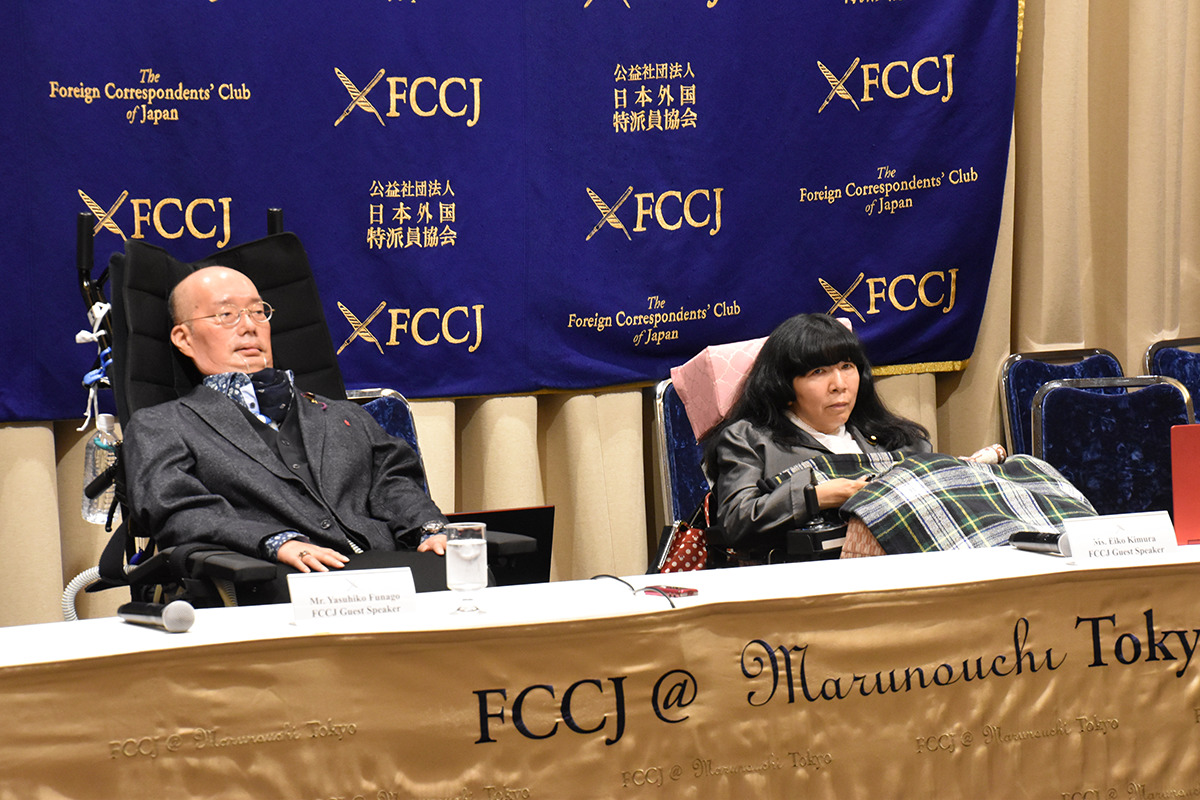




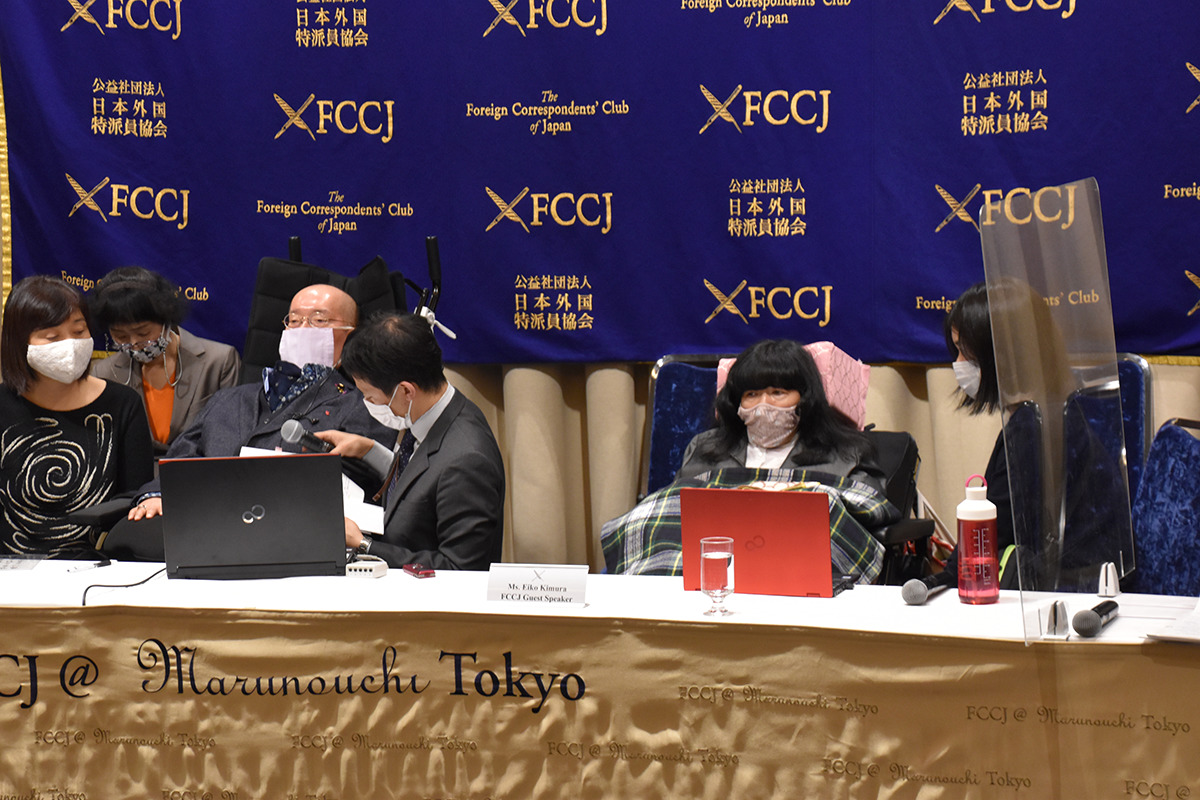
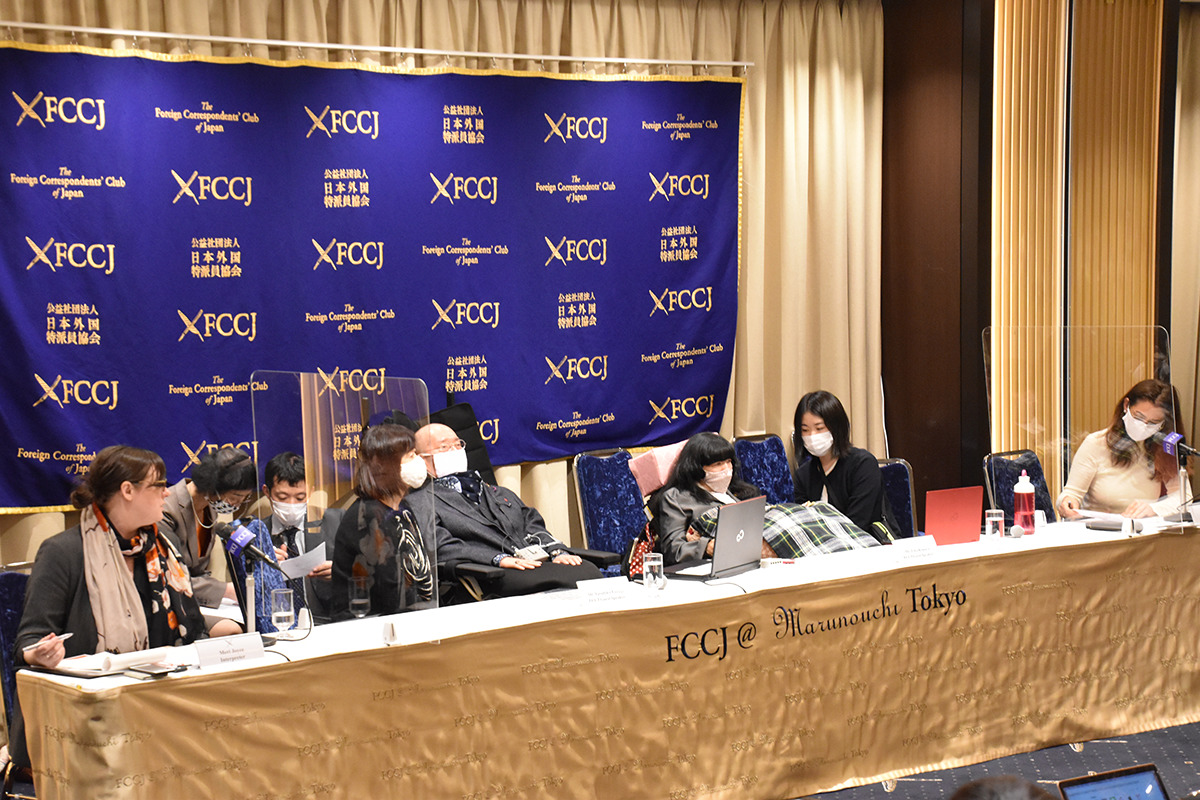
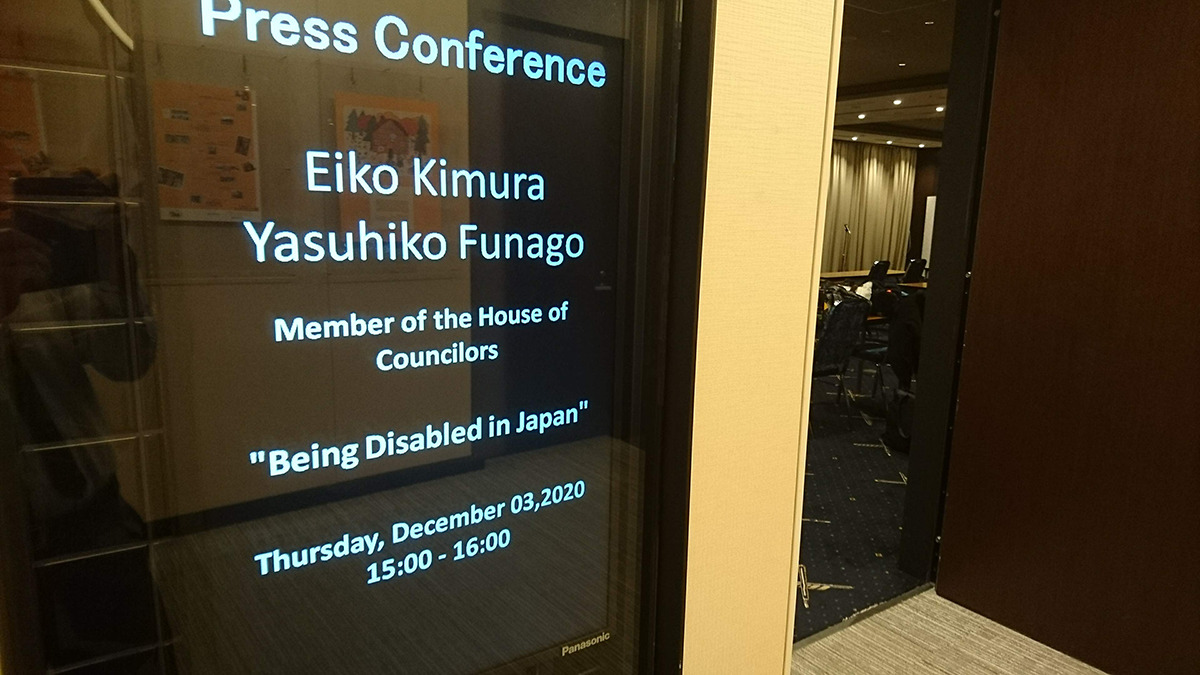
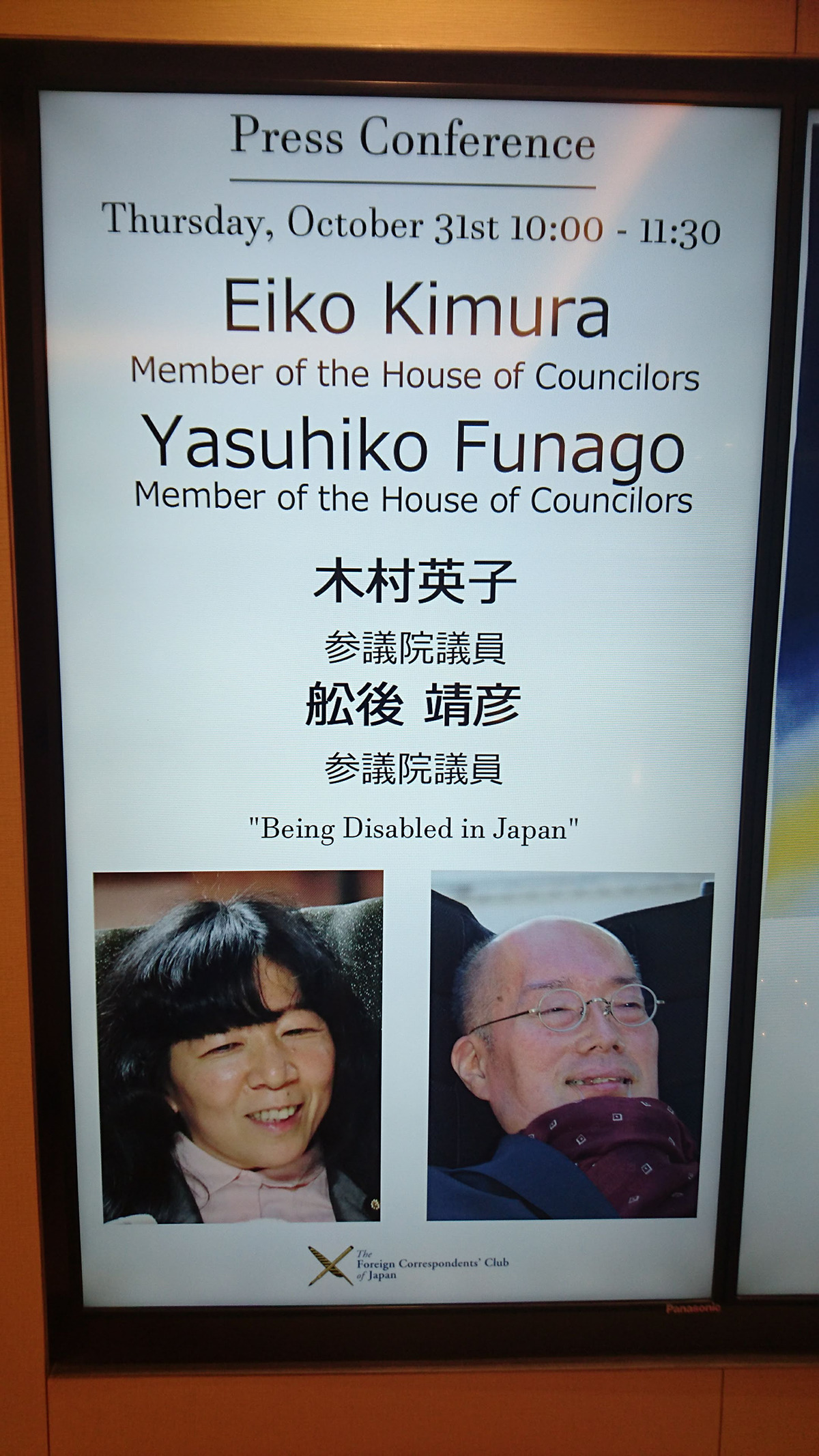
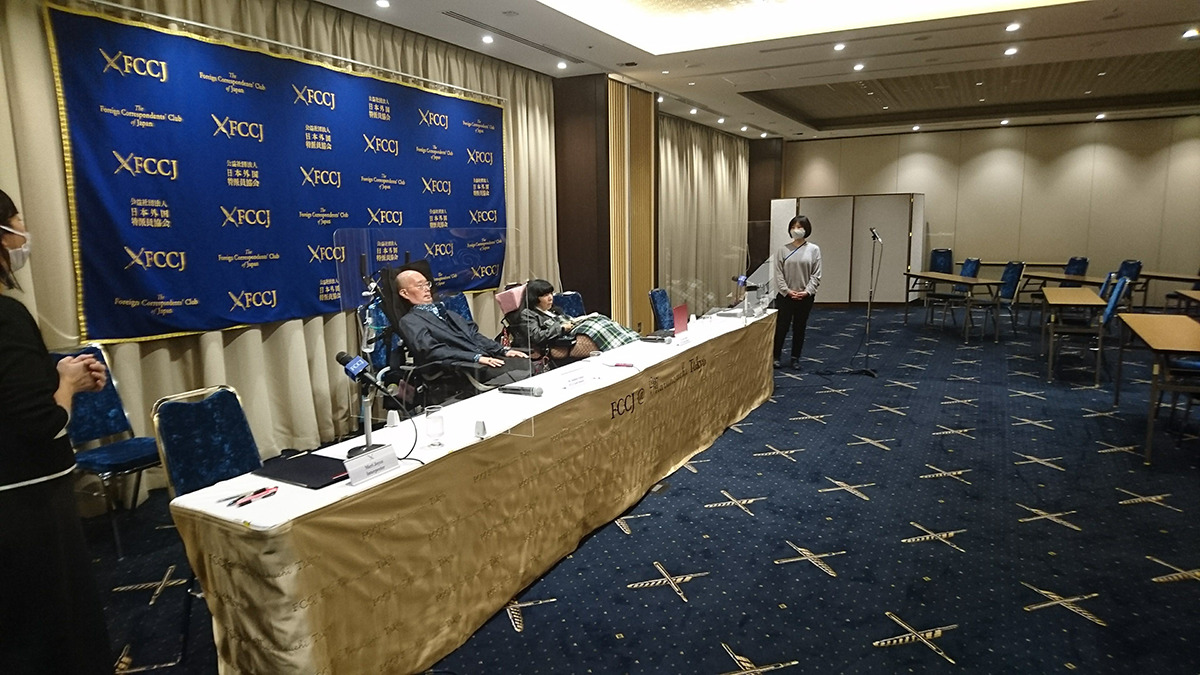

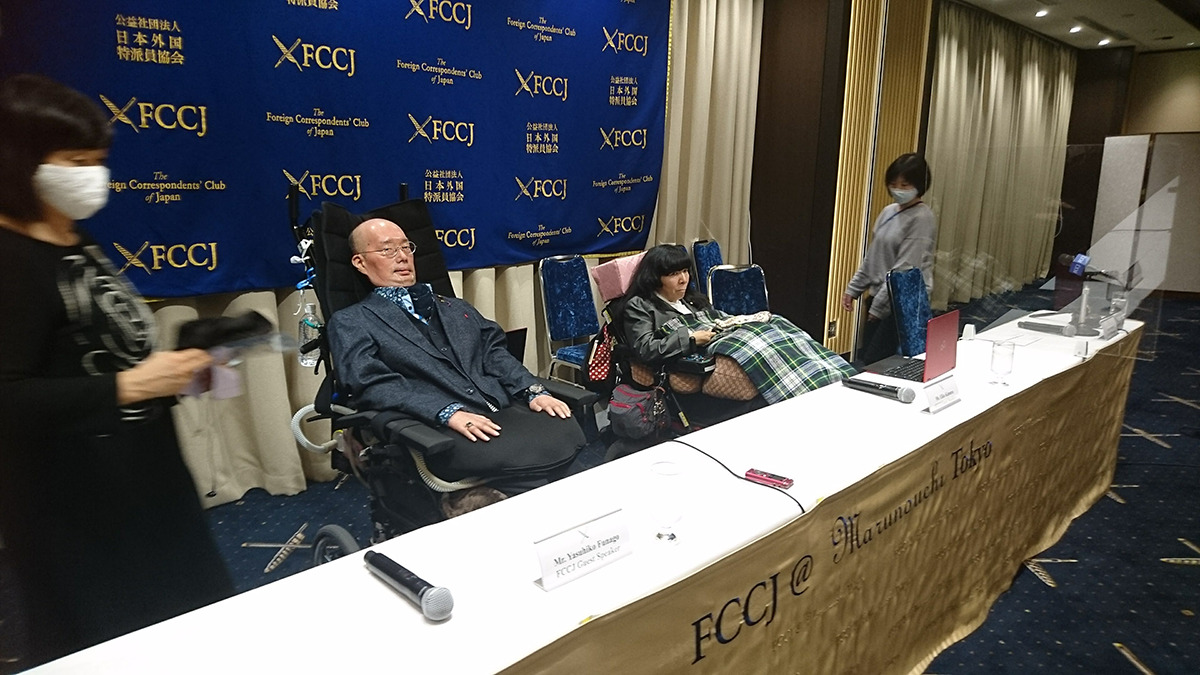
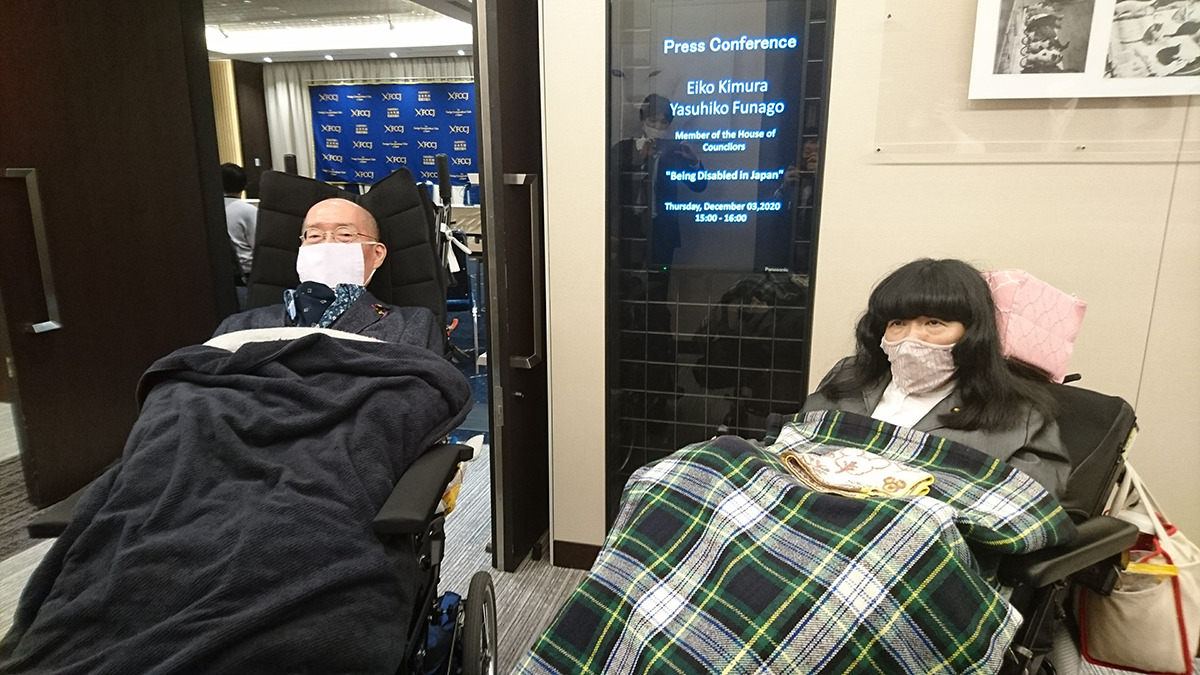
記者会見の様子は動画で公開されています。
【日本外国特派員協会 記者会見】れいわ新選組 参議院議員 木村英子・舩後靖彦 2020年12月3日
